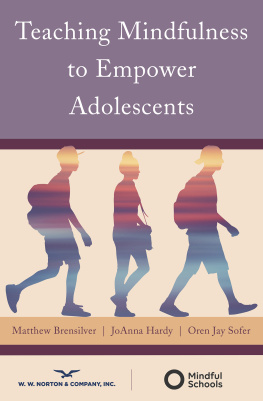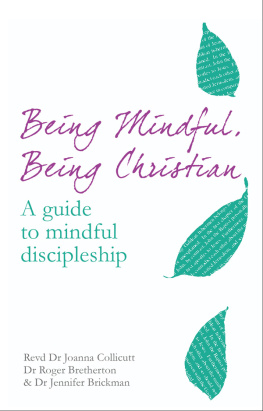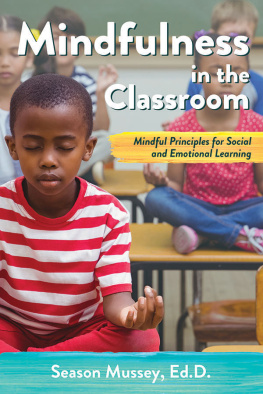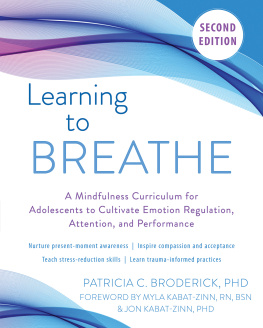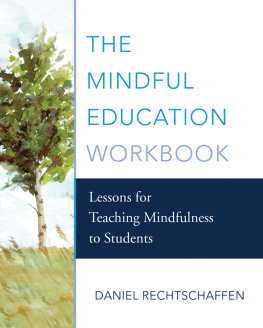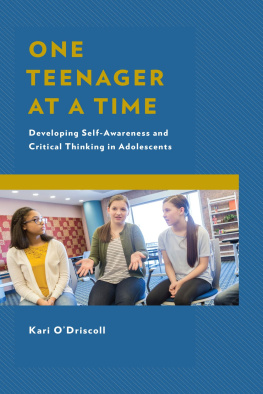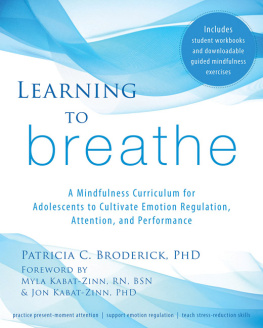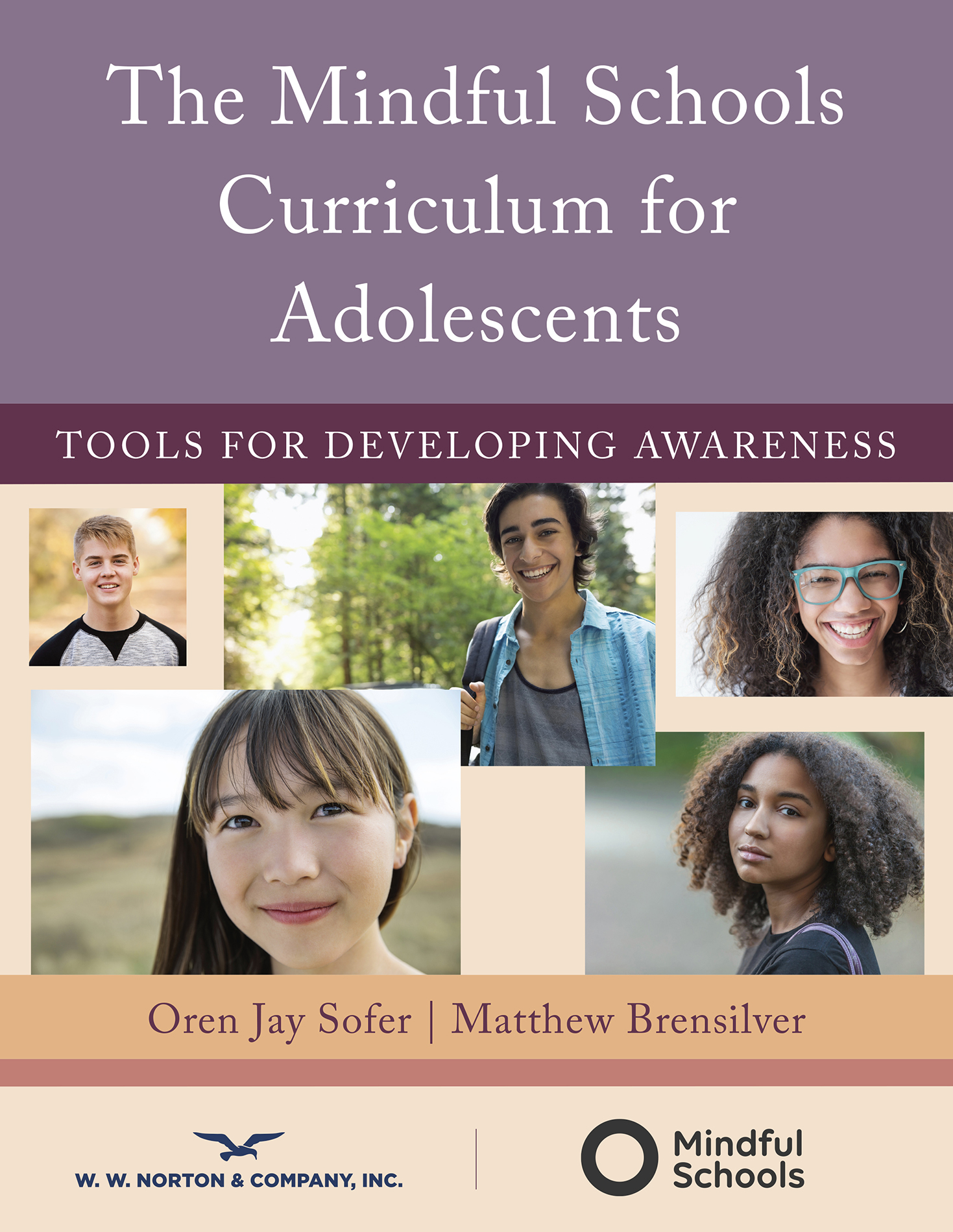Contents
Guide
Page List
The Mindful Schools Curriculum for Adolescents
TOOLS FOR DEVELOPING AWARENESS
Oren Jay Sofer and Matthew Brensilver

For the classroom teachers who do the essential work of opening the hearts and minds of youth and children, and for the youth they serve. May we see that another world is possible, and make that a reality.
Oren Jay Sofer
For Jacob & Gabriel
Matthew Brensilver
CONTENTS
This version of the curriculum was co-created by Matthew Brensilver and Oren Jay Sofer. It stands on the shoulders of the former program directors, Megan Cowan and Chris McKenna. Many others have generously contributed to previous iterations of the curricula over the years, including Vinny Ferraro, Laurie Grossman, Richard Shankman, Kate Munding, Daniel Rechtschaffen, Martina Schneider, Kevin Griffin, Gary Buck, Marvin Belzer, and Diana Winston. We have benefited substantially from the students who have received these lessons and the educators who have provided feedback. We thank Mindful Schools for supporting this project. We also wish to acknowledge Randy Fernando, who was instrumental in the evolution of Mindful Schools. Lastly, we are deeply grateful for the wisdom and kindness of our own teachers, without whom this book would not exist.
The Mindful Schools Curriculum for Adolescents
Welcome to the Mindful Schools Adolescent Curriculum
We are very happy that you are reading this and are grateful for your commitment to practice and share mindfulness. We sincerely hope that this curriculum supports your efforts to foster self-awareness, empathy, and wisdom in yourself and in the young people in your care.
We view this curriculum not as a manual to be rigidly followed, but as a vehicle for you to share your own kindness, skill, and wisdom. The scripts are not intended to be read verbatim. In our years teaching adolescents, we have been impressed by the way that curricula serve as living documents. The lessons that are taught are the convergence of our minds and your minds. We are delighted to imagine all the ways you might innovate and build upon this curriculum.
In this brief introduction, we wish to highlight several underlying principles of this curriculum.
Developmentally appropriate with potential for depth. This curriculum is designed for young people ages 13 to 20. We have tailored the lessons to the particular developmental needs of adolescents, tying the practices to their most pressing concerns. At the same time, weve attempted to preserve the radical potentials of mindfulness. The practices unfolded in these lessons can be explored at different depths and may catalyze important understandings and prosocial orientations in the young people you teach.
Founded on behavioral science. Mindfulness is about mitigating stress and promoting flourishing. These aims are supported and energized by numerous lines of scientific research: behavioral change, psychotherapy research, clinical neuroscience, evolutionary psychology, and emotion regulation research. The curriculum drawsexplicitly and implicitlyfrom these bodies of knowledge. Sometimes, a scientific finding underscores a particular concept or practice and is explored explicitly in the lessons. Many of the lessons also include a Science Supplement that highlights relevant research to provide you with a fuller understanding of the scientific context. The curriculum also draws on a prominent model of the mechanisms of mindfulness from Tang, Hlzel, & Posner (2015). The key beneficial mechanisms of mindfulness include enhanced emotion regulation, attention stability, and self-awareness.
We regard our role of disseminating mindfulness research seriously. We take care to ensure that the personal confidence we have in mindfulness does not distort our estimation of its scientific basis. We aspire to offer training and resources that present mindfulness in a compelling and digestible manner, while honoring the complexity of scientific findings. The benefits of mindfulness are well-documented in adults, and neuroscientific studies offer plausible evidence regarding the mechanisms of these changes. Those data provide reason for optimism regarding the emerging science on mindfulness in students. We are actively engaged in understanding the emerging research and are committed to being responsive to new scientific findings. With this perspective in mind, we also wish to express our deep enthusiasm for integrating mindfulness into schools and the lives of young people.
Structured and adaptable. We attempt to provide a framework to guide your teaching, with flexibility to add or drop lesson components depending on the context. The transcripts present one possible version of the lesson, rather than lines to be read verbatim. The curriculum is a vehicle through which you can share your own skills and insights. It depends on your own embodiment of mindfulness, the familiarity you have developed with your mind, as well as the teaching skills you have acquired outside the context of mindfulness.
Secularity. Mindful Schools is unequivocally committed to a thoroughly secular approach to mindfulness practice. We are steadfastly committed to integrating mindfulness in education in a way that neither advances nor inhibits the religious beliefs (or lack of beliefs) of educators or students. This enduring commitment reflects our fundamental value of inclusivity. Only a thoroughly secular articulation of mindfulness avoids excluding people who might otherwise be interested in the practice. To fully honor the autonomy of students and our community members, the secularity of mindfulness is of paramount concern. (See our Guidelines for Secular Teaching of Mindfulness for specific recommendations.)
Integration of Social-Emotional Learning (SEL) components. The boundaries between mindfulness-based and SEL curricula are understandably fuzzy. The key skills of mindfulness (emotion regulation, attention stability, and self-awareness) have substantial overlap with the key skills of SEL (self-awareness, self-management, social awareness, relationships skills, and responsible decision making). We have attempted to integrate some components of SEL and blend them with mindfulness practice in the belief that this integration is synergistic.
Three versions of foundational lesson. There are many different ways to describe mindfulness and explain its relevance. Accordingly, we have created three different foundational lessons. We hope you will feel free to choose or adapt them to suit the needs of your particular context.
Structure of the Curriculum
We believe that teaching mindfulness lessons at regular intervals with a clear, repeated structure enhances their effectiveness. We highly recommend drawing a clear distinction between the mindfulness lesson and any previous activities. We have standardized the lesson structure and included repetition of key curriculum components to support learning.
The lessons are intended to be completed in 20 to 30 minutes. That said, in a cohesive and expressive class environment, exploration and conversation may extend the lesson time beyond 30 minutes. In general, weve erred on the side of giving you more information and options rather than fewer in the lessons. You can expand or condense them according to your needs, your students and the overall context.


